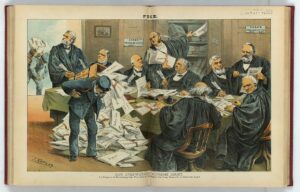An Anniversary of America’s First Progressive Revolution
Exactly a century ago, on Feb. 3, 1913, the 16th Amendment to the Constitution was ratified, authorizing a federal income tax. Congress turned it into a graduated tax, based on “capacity to pay.” It was among the signal victories of the progressive movement.This post originally ran on Robert Reich’s Web page, www.robertreich.org
Exactly a century ago, on February 3, 1913, the 16th Amendment to the Constitution was ratified, authorizing a federal income tax. Congress turned it into a graduated tax, based on “capacity to pay.”
It was among the signal victories of the progressive movement — the first constitutional amendment in 40 years (the first 10 had been included in the Bill of Rights, the 11th and 12th in 1789 and 1804, and three others in consequence of the Civil War), reflecting a great political transformation in America.
The 1880s and 1890s had been the Gilded Age, the time of robber barons, when a small number controlled almost all the nation’s wealth as well as our democracy, when poverty had risen to record levels, and when it looked as though the country was destined to become a moneyed aristocracy.
But almost without warning, progressives reversed the tide. Teddy Roosevelt became president in 1901, pledging to break up the giant trusts and end the reign of the “malefactors of great wealth.” Laws were enacted protecting the public from impure foods and drugs, and from corrupt legislators.
By 1909 Democrats and progressive Republicans had swept many state elections, subsequently establishing the 40-hour work week and other reforms that would later be the foundation stones for the New Deal. Woodrow Wilson won the 1912 presidential election.
A progressive backlash against concentrated wealth and power occurred a century ago in America. In the 1880s and 1890s such a movement seemed improbable if not impossible. Only idealists and dreamers thought the nation had the political will to reform itself, let alone enact a constitutional amendment of such importance — analogous, today, to an amendment reversing “Citizens United v. FEC” and limiting the flow of big money into politics.
But it did happen. And it will happen again.
Robert B. Reich, chancellor’s professor of public policy at UC Berkeley, was secretary of labor in the Clinton administration. Time magazine named him one of the 10 most effective Cabinet secretaries of the last century. He has written 13 books, including the best-sellers “Aftershock” and “The Work of Nations.” His latest, “Beyond Outrage,” is now out in paperback. He is also a founding editor of The American Prospect magazine and chairman of Common Cause.
Your support matters…Independent journalism is under threat and overshadowed by heavily funded mainstream media.
You can help level the playing field. Become a member.
Your tax-deductible contribution keeps us digging beneath the headlines to give you thought-provoking, investigative reporting and analysis that unearths what's really happening- without compromise.
Give today to support our courageous, independent journalists.






You need to be a supporter to comment.
There are currently no responses to this article.
Be the first to respond.